Did you know that 80% of healthcare data remains unstructured and largely untapped? Yet, AI technologies are transforming the way we approach healthcare by unlocking this potential.
For years, healthcare systems have struggled with massive amounts of disorganized data, inefficient diagnostics, and overwhelming administrative tasks. But with the rise of AI, all that is about to change.
By the end of this blog, you’ll understand how AI is revolutionizing healthcare, from improving patient outcomes to streamlining operations and why it’s a game-changer for the future of medicine. Ready to dive in? Let’s explore!
Artificial Intelligence and Healthcare
Artificial Intelligence (AI) first entered the scene in 1955, when John McCarthy coined the term. Fast forward to today, and AI is no longer just a concept– it’s a life-saving reality.
In healthcare, AI is proving to be a game-changer, with the global market expected to hit $188 billion by 2030.
But what exactly is AI in healthcare?
At its core, it's the use of machine learning, data analysis, and automation to improve patient care, streamline processes, and even predict outcomes.
So, how is AI being used in healthcare? It’s helping doctors make faster, more accurate diagnoses, predict disease patterns, and personalize treatment plans.
From robot-assisted surgeries to AI-powered drug discovery, the possibilities are endless. This transformative technology is reshaping healthcare, and it's just the beginning.
With AI in healthcare, the future of medicine is changing faster than ever. AI is not just improving patient care, it’s totally changing entire healthcare systems.
No wonder investors are creating a healthcare app embedding AI in it. We will get to know all about it in the sections below.
Artificial Intelligence in Healthcare: Market Insights and Growth Projections
The healthcare industry is on the brink of a monumental shift, and Artificial Intelligence (AI) is at the heart of it.
As the market continues to grow at an amazing rate, it’s important to understand the numbers behind this revolution.
Let’s get into some key stats that highlight the explosive growth and potential of AI in healthcare.
-
- Deep learning subsegment holds the largest market share in the AI in the healthcare sector.
- The global AI in healthcare market size was USD 26.57 billion in 2024, with a projected CAGR of 38.62% from 2025 to 2030.
- 51% of adults in the US have a positive outlook, expecting AI to drive progress in healthcare.
- 61% of people recognize AI's primary advantage in healthcare as its ability to efficiently diagnose and identify health conditions.
- 40% of organizations have already reported successful AI deployment.
The Growing Importance of AI in Healthcare Apps
AI in the healthcare industry is changing the way we approach medical treatments and diagnostics.
With the ability to analyze vast amounts of data quickly and accurately, AI has become a game-changer for healthcare providers and patients alike.
But you might be wondering, How does AI help in healthcare? Let's dive in and explore the crucial role AI plays in improving healthcare delivery, efficiency, and accuracy.
Here are some key ways AI is making a difference in the healthcare industry:
1. AI Enhances Diagnostic Accuracy
AI has the potential to drastically improve diagnostic accuracy.
Imagine an AI system that analyzes medical images faster and more accurately than a human can.
That’s AI in healthcare at work! By reducing the chances of human error, AI helps doctors spot diseases like cancer, heart conditions, and even rare diseases early.
With AI improving diagnostic accuracy in healthcare, doctors can make timely decisions, potentially saving lives.
If you're looking to create an AI app that assists in diagnostic tools, you’re stepping into a space with immense potential for better healthcare outcomes.
2. AI-Driven Healthcare Automation
AI is taking over repetitive administrative tasks in healthcare, allowing medical professionals to focus more on patient care.
From appointment scheduling to billing and patient data management, AI in healthcare helps reduce the burden on staff.
This leads to faster services, fewer errors, and more time for healthcare providers to connect with patients.
You get a smoother, more efficient healthcare experience, and staff are less stressed.
3. Early Disease Detection and Prediction
One of the most exciting aspects of AI is its ability to predict future health risks before they even appear.
AI can analyze trends in your medical data and predict whether you’re at risk for certain conditions, such as diabetes, cardiovascular disease, or even mental health issues.
By integrating AI in healthcare, doctors can intervene early, guiding you towards preventive measures that can keep you healthy for longer.
4. Personalized Treatment Plans Powered by AI
With Artificial Intelligence and healthcare app integration, you can expect healthcare to become more personalized than ever.
AI algorithms analyze patient data, including genetic information, lifestyle habits, and medical history, to recommend personalized treatment plans.
This means that your healthcare provider can tailor treatments to your specific needs, ensuring better outcomes and a higher quality of care.
This is how AI helps in healthcare – by making treatments more effective and precise.
If you’re considering AI app development services, incorporating personalized treatment algorithms can be a game-changer for medical professionals and patients alike.
5. Improving Patient Monitoring and Care with AI
With wearable devices and AI-powered health apps, real-time patient monitoring has become more accessible.
These devices track vital signs, such as heart rate, blood pressure, and even sleep patterns, and share the data with healthcare providers.
How does AI improve healthcare in this case? By detecting anomalies and alerting doctors instantly, AI ensures you receive timely medical attention before a minor issue becomes a major health risk.
Knowing the benefits is not enough, you also need to know the complete process to adopt Artificial Intelligence in Healthcare app development.
How to Implement AI in Healthcare?
If you are a business owner, one of the first questions you may have in your mind is, “ How to Implement Artificial Intelligence in Healthcare that gives fruitful solution.
Implementing AI in healthcare app development is a multi-step process that requires a well-planned strategy, advanced technology, and clear goals.
Here’s a breakdown of the steps to successfully implement AI in healthcare:
1] Define Your Objectives and Needs
Before diving headfirst into AI for healthcare, you’ve got to figure out your game plan.
Is it better diagnostics? Smoother patient care? Or maybe you’re just looking to streamline the chaos of operations? Once you’ve got your goals locked in, it’s time to tailor your AI and healthcare strategy to match.
When deciding between solutions, think about the choice of Generative AI vs Conversational AI- both have their strengths depending on what your goal is.
Knowing your needs ensures you pick the best Artificial Intelligence and healthcare tools to tackle those challenges head-on.
2] Choose the Right AI Technology
Here’s the thing: Artificial Intelligence in healthcare isn’t a one-size-fits-all solution.
You’ve got your machine learning, natural language processing (NLP), and even computer vision. So, how do you know what to pick? Simple: match the tech to your goals.
If you’re working on diagnostics, AI technology like image recognition might be your best bet. But if you're predicting outcomes, machine learning algorithms can do wonders. It's about getting the right tech in your corner!
3] Integrate AI with Your Existing Systems
AI in healthcare? Absolutely. But it doesn’t just work in isolation. It’s got to blend with your current systems, like your EHRs and patient management tools, so everything clicks together.
When AI tools integrate seamlessly into your workflow, it’s like having a superpower on your team. Real-time insights, better decisions, and smoother operations – what’s not to love?
4] Train Your Healthcare Team
Introducing AI into healthcare might seem intimidating at first, but once your team is trained, it’ll feel like second nature. Training your doctors, nurses, and admin staff ensures they’re ready to make the most of AI-powered systems.
After all, AI in healthcare apps isn’t here to replace people – it’s here to make their jobs easier and more effective. With proper training, AI becomes a trusted partner in the fight for better patient care.
5] Focus on Data Management
Here’s the deal: AI needs data to work its magic. And we’re not talking about just any data—clean, structured, accessible data.
A solid data management system ensures that your patient information is organised and ready to fuel your AI and healthcare tools.
Plus, staying compliant with privacy laws like HIPAA is a must. Your patients’ data stays protected while AI works its wonders.
6] Pilot the AI System
One important element of AI in healthcare app development, “testing!”
A pilot program gives you a chance to monitor how AI works in real-world conditions, catch any bugs, and adjust for smooth sailing.
With a well-thought-out pilot, you can iron out the kinks before going full scale, making sure your AI system is ready to roll.
7] Monitor Performance and Keep Improving
AI is constantly evolving, so AI tools should too. Regular monitoring and feedback loops ensure your AI system stays sharp.
Think of it like tuning a musical instrument – over time, you’ll make small adjustments to keep things in perfect harmony.
Tracking key metrics like accuracy, speed, and user satisfaction will help you continually refine your system. Because let’s face it, the healthcare industry never stops evolving, and neither should your AI.
AI in Healthcare Industry: Powerful Use Cases You Need to Know
AI is changing the way we approach healthcare, and the impact is undeniable.
From speeding up drug discovery to enhancing diagnostics and personalizing treatment plans, AI is making healthcare more efficient and accessible.
If you’ve been curious about how AI can transform your practice or improve patient care, you're in the right place.
Let’s explore the key areas where AI is making waves and improving outcomes across the board.
Now, let’s break it down into bite-sized pieces so you can see exactly how AI is working its magic in healthcare. Here's a quick look:
|
AI Technology |
What It Does |
Example Use Cases |
|
AI in Drug Discovery |
Speeds up the process of identifying new drugs by analyzing massive datasets and predicting molecular reactions. |
- Predicting molecular structures for diseases like cancer. - Streamlining clinical trials by identifying the right participants and reducing costs. |
|
AI in Diagnostics |
Analyzes medical images and data to detect diseases early and with higher accuracy than human analysis alone. |
- Detecting early-stage cancer through medical imaging. - Analyzing heart scans for signs of cardiovascular diseases. |
|
AI in Personalized Medicine |
Tailors treatments based on a person’s genetic data, lifestyle, and health history, ensuring more effective, targeted therapies. |
- Genomic data analysis to suggest the most effective treatments. - Predicting how a patient will respond to certain medications to avoid adverse reactions. |
|
AI in Robot-Assisted Surgery |
Enhances precision in surgeries through AI-powered robots, providing real-time feedback and improving surgical outcomes. |
- Assisting in minimally invasive surgeries, reducing recovery times. - Enabling remote surgeries through AI-driven robots, especially for underserved areas. |
|
AI in Virtual Health Assistants |
Offers real-time support to patients, guiding them through symptoms, medication reminders, and appointment scheduling, improving accessibility and care. |
- Acting as a symptom checker to decide if you need a doctor’s visit. - Managing medication schedules and refills, improving patient adherence. |
|
AI in Patient Monitoring |
Continuously tracks patient data (e.g., vitals, activity, and medication adherence) to predict potential health issues and improve ongoing care. |
- Monitoring chronic conditions like diabetes or heart disease in real-time. - Predicting patient deterioration, such as in ICU or post-surgery recovery situations. |
Top Companies Leveraging AI to Revolutionize Healthcare
AI is changing the game in healthcare, and some companies are taking it to the next level.
If you Google what are some top companies implementing Artificial Intelligence in the healthcare industry, the list will consist of Tempus, Google Health, PathAI, CureMetrix and more.
From improving diagnostics to enhancing patient care and streamlining operations, these innovators are leading the charge.
Let’s take a look at how a few companies are using AI in healthcare to transform the industry and what makes them stand out.
1. Tempus
Tempus is all about precision medicine.
With a focus on using technology to help doctors make data-driven decisions, they’ve built one of the largest libraries of clinical and molecular data in the world.
Their contributions to the AI-powered healthcare industry are redefining how we approach personalized treatment.
How they’re using AI:
-
- AI-powered data analysis to assist oncologists in making more personalized treatment decisions for cancer patients.
- Machine learning models that analyze vast datasets of medical images, genomic sequences, and clinical data.
- Predictive algorithms that forecast patient outcomes improve the accuracy of treatment plans.
2. Google Health
Google Health is on a mission to leverage AI in the healthcare industry to help both doctors and patients make better-informed decisions.
Their work spans everything from improving medical imaging to creating AI-powered tools for patient care management.
How they’re using AI:
-
- AI-powered medical imaging tools can analyze and diagnose conditions like breast cancer and lung diseases with a higher degree of accuracy than traditional methods.
- Natural Language Processing (NLP) to extract useful insights from electronic health records (EHRs), helping doctors make faster decisions.
- AI-driven predictive models that forecast health outcomes, allowing doctors to intervene earlier and customize treatments.
3. PathAI
PathAI is on a mission to improve the accuracy of pathology diagnoses.
They’re using AI to assist pathologists by providing tools that help identify diseases, particularly cancers, with greater precision.
Their work in the AI-based healthcare industry is helping to reduce diagnostic errors and speed up treatment.
How they’re using AI:
-
- AI-powered image recognition to analyze pathology slides and detect signs of diseases like cancer.
- Deep learning algorithms that help pathologists determine the right diagnosis faster and with higher accuracy.
- AI-enhanced workflow integration that allows pathologists to focus more on patient care and less on manual analysis.
4. Babylon Health
Babylon Health is an innovative health service that brings AI into healthcare right to the palm of your hand.
They aim to provide affordable healthcare by using digital tools to assist with everything from consultations to health assessments.
Their solutions are creating a more accessible AI-powered healthcare industry.
How they’re using AI:
-
- Conversational AI that allows users to have virtual consultations with AI-powered chatbots, diagnosing common conditions.
- Symptom-checking tools that use AI to guide users to the right treatment or healthcare provider.
- Predictive AI models that analyze patient history and trends to provide personalized health insights and recommendations.
5. CureMetrix
CureMetrix is revolutionizing mammography by using AI to improve the accuracy of breast cancer detection.
Their AI algorithms are a great example of how AI in the healthcare industry can enhance diagnostic accuracy and ultimately save lives.
How they’re using AI:
-
- AI algorithms that enhance the accuracy of mammogram readings, identifying potential issues much earlier.
- AI-powered analytics that offer more precise scoring systems, improving decision-making for treatment plans.
- Data-driven insights that help radiologists focus on the most critical cases and reduce diagnostic errors.
6. Aidoc
Aidoc focuses on using AI to assist radiologists in analyzing medical imaging quickly and accurately.
They specialize in detecting and prioritizing urgent medical conditions, like brain haemorrhages and pulmonary embolisms, to ensure quick intervention.
This is a powerful example of the AI-powered healthcare industry making a difference in critical care.
How they’re using AI:
-
- AI-powered imaging analysis to detect life-threatening conditions, such as brain bleeds and strokes, with high accuracy.
- Real-time alerts notify healthcare professionals of critical findings that need immediate attention.
- Automated workflow optimization that saves time for radiologists and speeds up decision-making.
These companies are just a handful of the innovators leading the way in the AI-based healthcare app. Their work is making healthcare more accurate, efficient, and accessible, and it’s exciting to see where AI will take the industry next!
Challenges of Implementing Artificial Intelligence in Healthcare
Integrating Artificial Intelligence into healthcare isn’t all smooth sailing.
Despite the immense potential, there are significant challenges that organizations face in implementing AI solutions.
From data privacy to technology adoption, the road can get bumpy. Here are some of the main obstacles in implementing AI in the healthcare industry:
-
- Data Privacy Concerns: AI models rely heavily on patient data, which raises concerns about data privacy and app security. Ensuring compliance with regulations like HIPAA is crucial.
- High Implementation Costs: Adopting AI technologies can be expensive, especially when considering the infrastructure, training, and ongoing maintenance costs associated with the AI-powered healthcare industry.
- Resistance to Change: Healthcare professionals may resist AI integration due to fear of disruption in established workflows or concerns about AI replacing their roles.
- Data Quality and Accessibility: For AI to function optimally, the data must be high quality, structured, and accessible, but often, healthcare data is fragmented and unstructured.
- Regulatory and Ethical Challenges: The rapidly evolving AI field presents challenges in terms of ethical considerations and regulatory compliance, making it difficult to keep up with both technological and legal changes.
6 Top Future Trends of AI in Healthcare
So, are you wondering what some top future trends of artificial intelligence in Healthcare are? There are many, including personalized medicine, virtual assistant development, language processing in EHR and more.
All-in-all, the future of AI in the healthcare industry is incredibly exciting. As technology evolves, so will its applications in diagnostics, treatment plans, and patient care. Let’s explore some trends to watch for:
|
Trend |
Description |
|
AI-Driven Personalized Medicine |
Tailoring treatments based on individual genetics, lifestyle, and medical history. |
|
AI in Surgery |
Advanced robotic surgeries are assisted by AI, ensuring greater precision and quicker recovery times. |
|
Using AI to predict health risks and recommend preventive treatments. |
|
|
AI-Powered Virtual Health Assistants |
Chatbots and virtual assistants are improving patient engagement and providing quick medical advice. |
|
Natural Language Processing (NLP) in EHR |
NLP will continue transforming how medical professionals interact with electronic health records. |
|
AI for Mental Health |
AI tools will help monitor mental health and provide personalized therapies or interventions. |
These trends highlight just a few of the ways AI-based healthcare industry solutions will continue to evolve, ensuring better, faster, and more efficient care for patients worldwide.
How JPLoft Can Help You Implement Artificial Intelligence in Healthcare?
Imagine a future where healthcare is faster, smarter, and more efficient—thanks to the magic of Artificial Intelligence.
At JPLoft, we’re all about making that future a reality. As a top healthcare app development company, we specialize in blending AI with healthcare to solve real-world challenges.
Whether you’re looking to enhance diagnostics, optimize patient care, or streamline hospital operations, we’ve got the expertise to help you succeed.
With JPLoft by your side, we’ll guide you every step of the way to build AI-powered solutions that are as innovative as they are impactful.
Let’s shape the future of healthcare together!
Conclusion
In conclusion, the integration of Artificial Intelligence in healthcare apps is revolutionizing the industry, making healthcare more efficient, personalized, and accessible.
From improving diagnostic accuracy to automating administrative tasks, AI is reshaping the entire healthcare experience for both patients and providers.
As AI continues to evolve, its potential to enhance patient care, predict outcomes, and streamline processes will only grow.
Embracing this technology not only improves healthcare delivery but also offers a competitive edge to businesses in the healthcare sector.
To stay ahead, adopting AI in healthcare apps is crucial for future success and innovation.
FAQs
AI enhances diagnostics, personalized treatment, and predictive analytics by analyzing large datasets to improve decision-making, automate tasks, and optimize patient care
Tools like IBM Watson, Google Health, and DeepMind are used to analyze medical data, support decision-making, and aid in research and diagnostics.
AI is used in medical imaging, virtual health assistants, personalized treatment plans, drug discovery, and predictive analytics for disease outbreaks
AI offers opportunities for improved patient care, early disease detection, cost reduction, operational efficiency, personalized medicine, and enhanced drug discovery.
AI will play a key role in transforming healthcare by improving diagnostics, streamlining workflows, enabling personalized treatments, and facilitating early disease detection for better patient outcomes.





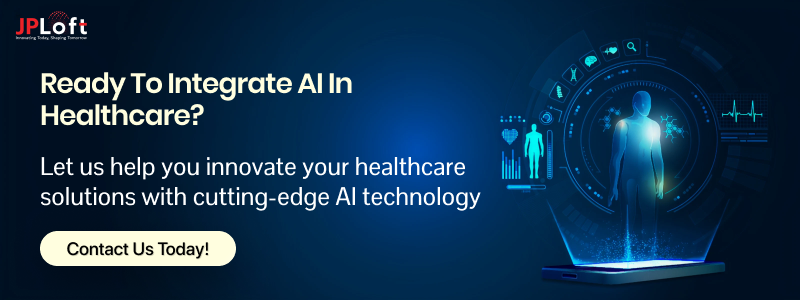
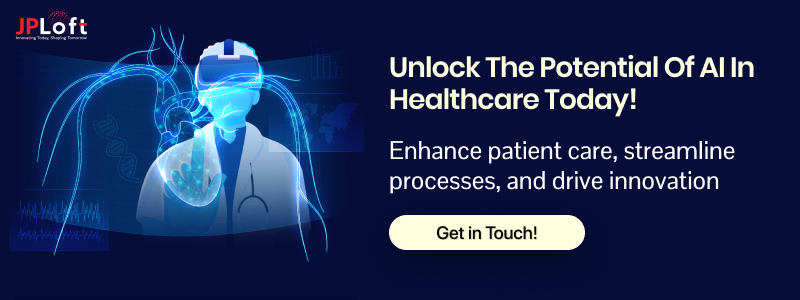

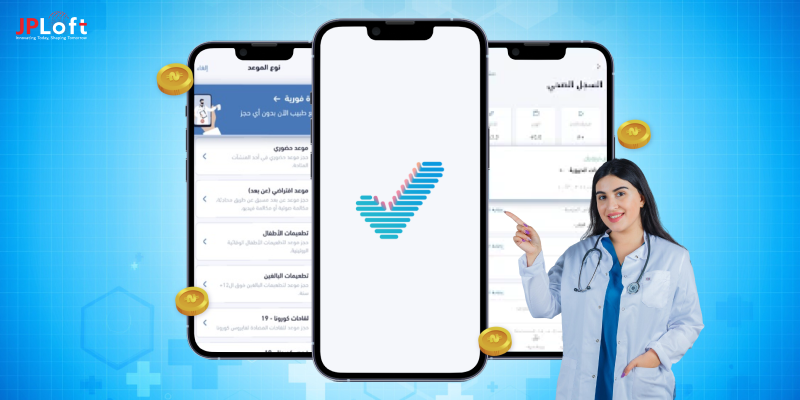
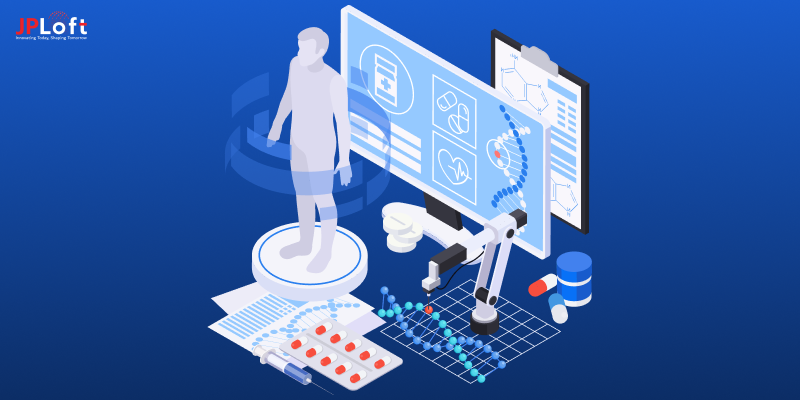
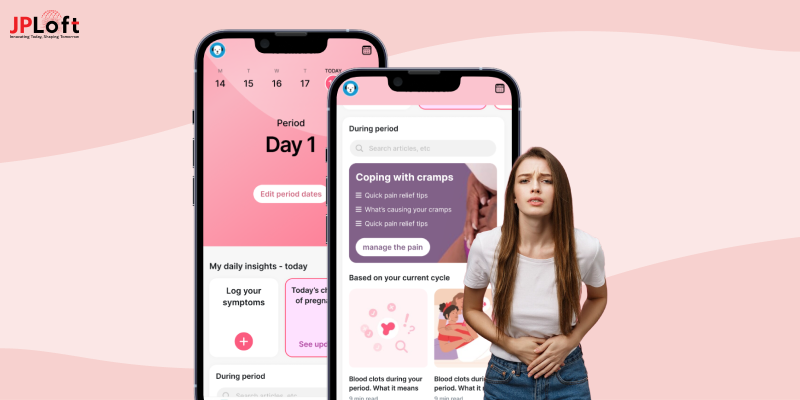



Share this blog